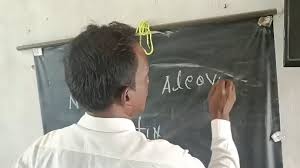A disturbing video has surfaced on social media, shaking the already fragile public faith in India’s government education system. The clip, allegedly from a government school in Balrampur district, Chhattisgarh, shows a government-appointed teacher unable to write the simple English numbers “Eleven,” “Eighteen,” and “Nineteen.” The embarrassment didn’t end there. When students were asked to name the Prime Minister or the Chief Minister of their state, none could respond correctly — or at all.
This is not just a viral moment of shame; it is a reflection of a systemic rot that threatens the very foundation of our nation. It raises a serious question: Are our schools becoming factories of ignorance instead of centers of learning?
Government school teachers are supposed to be trained professionals, selected through competitive examinations and qualified with degrees in education. The public assumes, quite reasonably, that they are equipped to guide young minds in their formative years. However, when a teacher — the pillar of that very system — is unable to write basic English numerals that even fourth-grade private school students can spell without hesitation, the entire purpose of the system is thrown into question.
Even more alarming is the level of ignorance displayed by the students. The inability to name the country’s top leaders isn’t just a gap in general knowledge; it points to a complete absence of civic awareness. As the saying goes, “Today’s students are tomorrow’s citizens,” but what kind of citizens are we shaping in these classrooms?
The blame cannot rest on individual teachers or students alone. This is a deeply rooted administrative failure. From teacher recruitment and training to syllabus planning and school inspections, everything needs an urgent overhaul. It seems that political interests and bureaucratic lethargy have turned government education into a performative service, more concerned with filling posts than filling minds.
Chhattisgarh is not alone in this crisis. Across India, rural and semi-urban government schools are suffering from teacher absenteeism, lack of accountability, outdated teaching methods, and poor infrastructure. While schemes like Samagra Shiksha Abhiyan and Mid-Day Meal aim to boost enrollment and retention, they cannot replace the core need for quality education.
The long-term consequences are frightening. Millions of students graduate every year from government schools without basic literacy, numeracy, or civic understanding. They enter adulthood under-equipped for employment, participation in democracy, or contribution to national growth. This is not just an educational crisis — it is a national emergency.
India’s education policy must prioritize teacher accountability, real-time performance monitoring, and stronger community participation. Public funds cannot be wasted on underqualified individuals who fail at their most basic duty: educating.
It’s time to stop treating such incidents as isolated embarrassments and begin a serious, nationwide conversation on the future of education in India. The classroom is where a nation is built — or broken. The question now is, are we building a future — or burying it?





